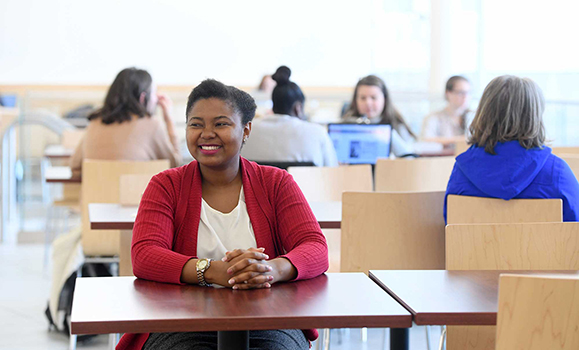When Claire Seremba completed her undergraduate degree in Women, Gender and Development Studies she, like many university graduates in Uganda, was not adequately prepared to build a career.
“The priority was on school, not the outcomes”, she recalls. “There’s little support for creating connections within the working world.”
Fortunately, Claire had the chance to volunteer at the Ministry of Education and Sports, which helped her gather information when she decided to pursue her master’s degree. At first, she looked to Geneva because she’s interested in working with the UN but her professor at Makerere University encouraged Claire to apply to HÂţ».
“I hadn’t considered Canada until then”, she says. “I didn’t know much about it. But when [International Development Studies] Professor [Matthew] Schnurr explained the program to me, I was very interested in the interdisciplinary setup.”
Expanding horizons
The program draws on courses from Biology, Economics, Law, Political Science, Social Work and other fields, and has challenged Claire to move beyond women’s issues and select topics that relate to Claire’s evolving goals.
“It’s got me thinking differently, which I like. I was one-minded,” she admits, “but now I have new interests.”
Those new interests include the idea of returning to Uganda to help create career pathways for new graduates — but first she might pursue another degree. She expects to graduate with her Master of Arts in International Development Studies in spring 2018.

While she’s eager to expand her academic focus, women and gender-related rights remain near and dear to Claire’s heart. So, when her first task as a peer educator with Human Rights and Equity Services was to help organize the 16 Days of Activism Against Gender-Based Violence campaign, it was a welcome opportunity.
“It’s a nice fit with everything I’ve done in my past but it’s also a personal thing for me,” she explains. “I’ve experienced violence and discrimination as a young woman. I was raised in an environment where women were not as valued and though that’s changing more and more, there’s still much to be done.”
The peer educators came up with the idea of hosting a button-making party so people can show support with a customized message. “People can wear personal action statements or advocate with their own voice to help destigmatize and break the silence,” says Claire.
Wearing a button is just one of the ways members of the Dal community can present a united voice on the issue. Claire points out that the 16 Days also offer opportunities to get directly involved in the conversation. “Many of the activities help create space for individuals who want to speak about their experience or inform themselves.”
Serving others
Beyond campus, Claire was recently involved in the where she engaged with others about the different services and resources available to international students. She’s also worked with ’s Student Refugee Program and has lent a helping hand to .
“My grandmother taught me that you need to have a heart that gives and not for yourself. You were made to serve others so you should be a servant first and lift up others, especially when you enjoy more privilege.”
Her current research project illustrates the intersection between her desire to improve career education and her fight against gender-based violence. She’s interviewing women in Uganda who have opened their own businesses, which for them is a brave decision that’s beginning to improve the status of women within their communities.
“The women often have to overcome so much resistance but eventually, people see they have the skills and they become successful. I love to hear their stories,” she says with a smile. “They’ve accomplished so much and I’m inspired by their resilience.”
Claire is studying at Dal as part of the Queen Elizabeth II Diamond Jubilee Scholarship program. Established in 2012, the program is a national collaborative initiative that operates through the Rideau Hall Foundation, Community Foundations of Canada and Universities Canada.
Learn more about the program.

